North America Archive
Free Newsletter
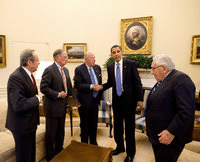
President Barack Obama’s lofty pursuit of a world without nuclear weapons is off to a peculiar start. But the main reasons are not Kim Jong-il’s nuclear saber-rattling on the Korean peninsula, the centrifuges continuing to spin in Iran, or even the political and technical reasons that skeptics highlight to mock President Obama’s decision to recommit the U.S. to eliminating nuclear arsenals around the world. Instead, the twin Achilles’ heels of the “no nukes” quest are that patience, rather than urgency, is the prevailing attitude, and that the disarmament community has failed to engage youth movements as an antidote to the […]
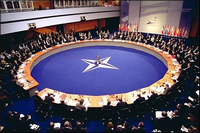
NATO officially launched the process of revamping its Strategic Concept this month. As of now, the alliance’s next mission statement is “a blank sheet of paper,” in the words of outgoing Secretary General Jaap de Hoop Scheffer. But NATO’s recent pronouncements and current challenges offer plenty of guidance on how to fill the page. First, NATO nations must invest more in defense, and they must remember that theirs is, above all, a military alliance. As the secretary general observed, military operations are “NATO’s core business.” The U.S. spends about 4 percent of its GDP on defense, but only four other […]
In preparation for a France 24 panel discussion program yesterday — which unfortunately hasn’t been put online yet (Note: Part I now available here, Part II here) — I tried to dial in a bit more closely this idea of President Barack Obama’s foreign policy so far representing a great deal of continuity with the final two years of the Bush administration. And what I came up with, and had the pleasure of discussing with some very insightful fellow panelists, was not so much an either/or comparison between the two, but rather a multi-layered model of Obama’s foreign policy. The […]

Thanks to the assets and strategy developed during the past decade, the United States has thus far effectively managed the swine flu (H1N1) threat. The resources, plans, and authority now at the federal government’s disposal have enabled it to respond to a major health crisis that caused more serious problems in other countries. The Bush administration left a robust toolkit for the Obama team, which for its part has used it well. Cooperation among federal, state, local, private, and other important actors has been effective in distributing public face masks, implementing mass inoculation campaigns, and taking other timely responses. At […]
What a difference a decade makes. I remember being back in NY for a two-week vacation in the summer of 1998. One afternoon, while wandering around Little Italy, I saw the following sign, handwritten in marker on a piece of brown cardboard carton, taped to a ground-floor window on Mulberry Street: Today at Yankee Stadium, David Wells pitched a perfect game. I remember being struck by three things about that sign. First, that someone, having learned of something they felt was newsworthy inan age of instantaneous telecommunications and round-the-clock media,had nonetheless fabricated a sign and taped it to their window […]
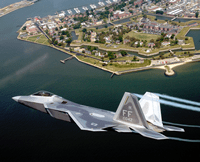
Last week, while I was busy writing about two fascinating scenarios for the future of U.S. influence, Secretary of Defense Robert Gates was delivering the latest in a long line of brilliant speeches, this time in Chicago. In it, he nailed down exactly the kinds of concrete changes that must happen in order to retool the institutions of American foreign policy for the radical challenges of the next two decades. The speech underscored that, even as Gates emerged victorious this week from a Washington budget battle, there’s a more massive challenge looming. At first glance, the battle in Washington was […]
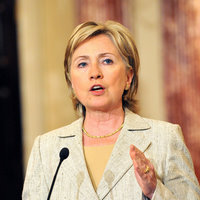
The Quadrennial Diplomacy and Development Review (QDDR) announced by Secretary of State Hillary Clinton on July 10 seems like a long overdue project for the State Department, which has lost ground in recent decades to the Department of Defense in steering U.S. foreign policy. But although initiating a review is a valuable undertaking, some observers say it will likely produce underwhelming results — for Clinton, for the State Department, and for U.S. foreign policy itself. Clinton’s plan is modeled on the Defense Department’s Quadrennial Defense Review (QDR). Mandated by Congress in 1996, the QDR is a study that outlines the […]
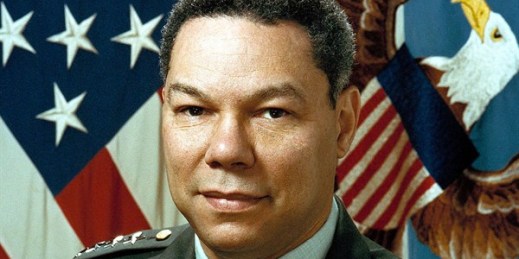
Editor’s note: The following article is one of 30 that we’ve selected from our archives to celebrate World Politics Review’s 15th anniversary. You can find the full collection here. Once upon a time, there was a grand and influential foreign policy doctrine. It was based on some traditional notions about U.S. statecraft that placed severe constraints on when America went to war. It asserted that when the United States used military force, it must do so in decisive fashion and only in the service of vital national interests.* For any military action, it counseled the dispassionate weighing of costs and benefits, […]

Upon taking office in January 2009, in addition to inheriting ongoing wars in Iraq and Afghanistan, President Barack Obama also inherited twin nuclear crises with North Korea and Iran. North Korea conducted its second nuclear test in May 2009, while Iran continues to flout U.N. Security Council resolutions requiring the suspension of its uranium enrichment program, which the United States and other countries believe is central to Tehran’s clandestine effort to acquire nuclear weapons. The nuclear crises are playing out against the backdrop of potentially significant societal developments in both countries. In North Korea, a stroke reportedly suffered by Kim […]

Last week’s major policy address by Secretary of State Hillary Clinton was as noteworthy for the strategic concepts she dismissed as for the ones she embraced. Clinton provided Americans with a strong sense of how she plans to conduct U.S. foreign policy: not merely as “the indispensable nation” that assumes international leadership, but rather as the global rule-set convener that aggressively builds partnerships across a strategic landscape pulsating with rising players — both state-based and transnational. In doing so, Secretary Clinton explicitly rejected the emerging — and yet painfully antiquated — conventional wisdom that portrays a world inevitably divided into […]
Thomas P.M. Barnett flags an article on a subject I’ve been keeping an eye on recently. According to the WSJ, global migration patterns have reversed, with immigrants increasingly returning to their countries of origin as a result of the global downturn, in addition to actual immigration slowing down. I’d initially expected the reverse to be true, at least in terms of the latter phenomenon. According to the WSJ, the reason why fewer people are setting out for the “lands of opportunity” is that they might just find more opportunity at home. I’ve been doing some reading recently on informal economies, […]

Measuring American influence from week to week seems enough of a challenge, as a glance at recent global developments illustrates. The electoral upheaval in Iran, for instance, will almost certainly give the U.S. the upper hand in any upcoming nuclear negotiations. Unless, of course, it doesn’t. Likewise, China’s distancing itself from North Korea will strengthen the U.S.’s position at the U.N. Security Council. Or it might not. The difficulty in knowing for sure arises from the fact that gauging even the nearest term outcomes means making sense of many moving parts. What about the long term? Two recent studies from […]
I’m trying not to be too cynical about the speeches, because I recognize that they often serve as the birthplace of foreign policy doctrines. I’m not sure if we yet have the makings of an Obama doctrine, per se, since President Barack Obama’s four major speeches have so far been more calibrated to specific audiences, even if there have been some broad declarations of vision. But Secretary of State Hillary Clinton’s speech yesterday seems like an ambitious attempt to collect the scattered bits of already articulated principles into a coherent conceptual structure for the Obama administration’s conduct of foreign policy. […]
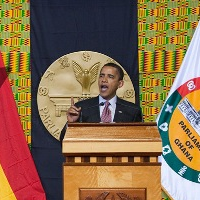
President Barack Obama’s speech before Ghana’s Parliament on July 11 marked his fourth major discourse on international affairs since taking office. Just as he did in Cairo little over a month ago, Obama outlined his vision of a region of the world — this time sub-Saharan Africa — and America’s role in it. Obama emphasized the need for more equal relations between the United States and Africa, a shift from patronage to partnership, and the importance of Africans taking responsibility for their own destiny. He lamented that “the West has often approached Africa as a patron, rather than a partner.” […]
Marc Lynch has unleashed a blog phenomenon with a foreign policy exegesis of the Game’s challenge to rap “hegemon” Jay-Z. The original post is here, and Lynch followed up with a roundup of replies here. The question facing Jay-Z of whether and how to respond to the attack, according to Lynch, illustrates the dilemma before any hegemonic power in the face of a weaker, but potentially threatening, upstart. Lynch uses Jay-Z’s now-reconciled feud with Nas as an example of the unintended and unexpected consequences of escalation. But my immediate thought on reading the piece was to an incident from the […]
